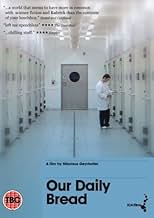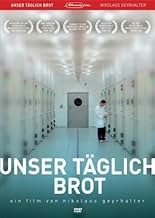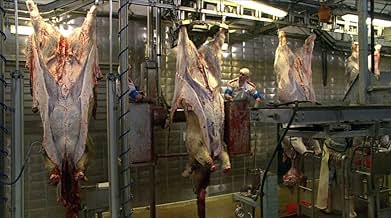IMDb-BEWERTUNG
7,5/10
2735
IHRE BEWERTUNG
Füge eine Handlung in deiner Sprache hinzuOUR DAILY BREAD is a wide-screen tableau of a feast which isn't always easy to digest - and in which we all take part. A pure, meticulous and high-end film experience that enables the audien... Alles lesenOUR DAILY BREAD is a wide-screen tableau of a feast which isn't always easy to digest - and in which we all take part. A pure, meticulous and high-end film experience that enables the audience to form their own ideas.OUR DAILY BREAD is a wide-screen tableau of a feast which isn't always easy to digest - and in which we all take part. A pure, meticulous and high-end film experience that enables the audience to form their own ideas.
- Regie
- Drehbuch
- Hauptbesetzung
- Auszeichnungen
- 4 Gewinne & 5 Nominierungen insgesamt
Empfohlene Bewertungen
It is great. Not because of the subject or because I'm so interested in the food processing industry.(I'm really not) It is great because it ask and answer some really new things about documentary.
If not new,"different" in the best possible interpretation of the word. No talking, that means no interview or voice over. No editing tricks,just perfect efficient shots, one after the other. Forget the angry guy behind the camera or the microphone who really wants to not only show but persuade you. Forget the radio-documentary, here come the images-documentary. If you liked Depardon's documentary, if you like photography, if you are tired of Mickael Moore, if you don't think you need to be told what to think when you can just see it, there is a movie for you.
Its a lot more than a documentary about food industry as far as I'm concern, its about backing up and trying to get " a bigger picture"
MAc
If not new,"different" in the best possible interpretation of the word. No talking, that means no interview or voice over. No editing tricks,just perfect efficient shots, one after the other. Forget the angry guy behind the camera or the microphone who really wants to not only show but persuade you. Forget the radio-documentary, here come the images-documentary. If you liked Depardon's documentary, if you like photography, if you are tired of Mickael Moore, if you don't think you need to be told what to think when you can just see it, there is a movie for you.
Its a lot more than a documentary about food industry as far as I'm concern, its about backing up and trying to get " a bigger picture"
MAc
I'm always a sucker for films that try to emulate Baraka or Koyaanisqatsi. Non narrative films that let the images speak for themselves. A lot of films try and fail. Sometimes the images are too boring, sometimes it's too repetitive. 'Our Daily Bread' just about nearly gets it right by exploring how the food on our table comes to be. By going all over the world, and exploring all sorts of food, the filmmakers cover a spectacular realm of food, animals, and people for the documentary. Much is spectacular. What I found, and maybe I'm just a sicko, who knows, but I found the segments regarding how animals are processed to be the most fascinating. They almost completely copied the chick harvesting from Baraka (and who could blame them!) to the, I'm sorry, totally cool way they kill pigs nowadays. FUN FOR EVERYONE! Ha ha! I loved it!
This might be a film aliens exploring the human food system would produce. There is no dialogue, no explanations. Everything you see is repeated ten times. There is no particular order to what you see. There is no gross animal cruelty, just a clean, clinical, efficient Germanic lack of concern for animal welfare.
The silence and monotony gives a creepy feel about even things you might not normally consider sinister, like mining fertiliser. The sheer scale made me nauseous. The flow of pig, cow and chicken carcases goes on forever without pause. The hypnotic repetition creates a horrible inevitability.
Scenes that stick out: banks of chickens like inmates "heckling" two "guards" who walk down between the rows.
A cow that knows it is about to be killed and puts up a valiant attempt to escape.
A machine for vacuuming up chickens.
A Rube Goldberg contraption for gutting fish.
A man whose job is to mount fish on a sort of hobbyhorse to prepare them for further mechanised treatment. Hour after after he performs the same little grab and twist movement.
Men picking cabbages mounting in a frame that drives them at management's rate.
African immigrants without the money to buy the vegetables they grow in a greenhouse.
Casual calm castration, debeaking, slaughter and interfering with reproduction.
We humans have a sort of compact with domestic animals. We protect them from predators, we ensure they have food, we protect their health. In return they give us milk and meat. I think we are obligated to give them lives free from cruelty, reasonably close to life in the wild. But we have reneged. We care not a whit for their well being. Everything is for human convenience. We cheated. We ripped them off.
The silence and monotony gives a creepy feel about even things you might not normally consider sinister, like mining fertiliser. The sheer scale made me nauseous. The flow of pig, cow and chicken carcases goes on forever without pause. The hypnotic repetition creates a horrible inevitability.
Scenes that stick out: banks of chickens like inmates "heckling" two "guards" who walk down between the rows.
A cow that knows it is about to be killed and puts up a valiant attempt to escape.
A machine for vacuuming up chickens.
A Rube Goldberg contraption for gutting fish.
A man whose job is to mount fish on a sort of hobbyhorse to prepare them for further mechanised treatment. Hour after after he performs the same little grab and twist movement.
Men picking cabbages mounting in a frame that drives them at management's rate.
African immigrants without the money to buy the vegetables they grow in a greenhouse.
Casual calm castration, debeaking, slaughter and interfering with reproduction.
We humans have a sort of compact with domestic animals. We protect them from predators, we ensure they have food, we protect their health. In return they give us milk and meat. I think we are obligated to give them lives free from cruelty, reasonably close to life in the wild. But we have reneged. We care not a whit for their well being. Everything is for human convenience. We cheated. We ripped them off.
In contrast to the well-meaning but didactic and dry FOOD INC., this documentary explores the process of mass food production without preaching or judgment. Because it is entirely wordless (well, not entirely... we hear some of the workers chatting, but since it's left untranslated, I assume it's the inconsequential small talk it appears to be). While this might make it less informative, the images speak volumes about how cold and impersonal the process is. Machines invented for extremely specific animal-rendering tasks (the "chicken vacuum" is a total mindf*ck), people performing repetitive and methodical jobs, massive facilities crammed with rigidly parceled animals. The cinematography is superb, with framing that is Kubrickian in its sense of scale, depth and symmetry. The film is hypnotic and meditative, giving the viewer room to form his own opinions, to wander down different avenues of thought regarding how we produce and consume food. Geyrhalter is careful not to dehumanize the workers, no matter how inhuman the process is. We often see them hanging out, or enjoying their own meals. Don't hate the playa, hate the game. And one doesn't get the sense is Geyrhalter is merely finger-wagging. Although there are brutally disturbing images (maybe worse than any other slaughterhouse footage I've seen), there is almost an admiration for how efficient these routines are. But again, any conclusions you draw are your own. Will I change my consumption habits? Knowing me, probably not, but it certainly got me thinking about it.
The movie is a stunning visual documentary of modern day food production. There is no dialog - just visuals (with sound).
The video is taken from food production facilities in Europe. With the growth of the worldwide population, it is fascinating to see how streamlined (and a bit "freaky") food production has become. It's almost like watching factory assembly lines punching out one "widget" after another.
Sometimes it's disturbing to watch because the "widgets" are live animals or carcasses. These scenes made me really think about population expansion - it's very unsettling to think about how much this type of food production will have to be escalated to feed the growing masses.
If you are intrigued by mass production processes of basic vegetable and meat food supplies, this is a great film to see. It's a visual diary of the processes involved.
The video is taken from food production facilities in Europe. With the growth of the worldwide population, it is fascinating to see how streamlined (and a bit "freaky") food production has become. It's almost like watching factory assembly lines punching out one "widget" after another.
Sometimes it's disturbing to watch because the "widgets" are live animals or carcasses. These scenes made me really think about population expansion - it's very unsettling to think about how much this type of food production will have to be escalated to feed the growing masses.
If you are intrigued by mass production processes of basic vegetable and meat food supplies, this is a great film to see. It's a visual diary of the processes involved.
Wusstest du schon
- VerbindungenReferenced in Film Junk Podcast: Episode 232: Inglourious Basterds (2009)
Top-Auswahl
Melde dich zum Bewerten an und greife auf die Watchlist für personalisierte Empfehlungen zu.
Details
Box Office
- Weltweiter Bruttoertrag
- 71.810 $
- Laufzeit1 Stunde 32 Minuten
- Farbe
- Sound-Mix
- Seitenverhältnis
- 1.85 : 1
Zu dieser Seite beitragen
Bearbeitung vorschlagen oder fehlenden Inhalt hinzufügen

Oberste Lücke
By what name was Unser täglich Brot (2005) officially released in India in English?
Antwort







